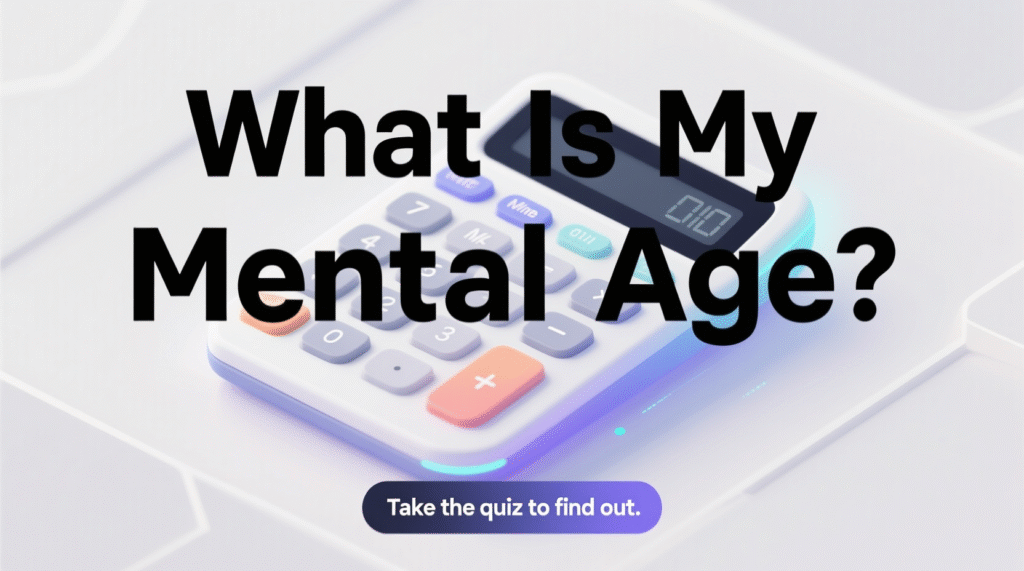
Most people know their chronological age—the number of years since birth. But when you ask “What is my mental age?”, you’re looking for something deeper. Your mental age reflects how you think, react, and approach life compared to others. Sometimes it matches your real age, but often it’s younger or older.
Mental age is the age that best represents your maturity, mindset, and decision-making style. While your chronological age increases each year, your mental age can shift depending on experiences, habits, and personal growth.
Curious already? Try this free Mental Age to see how your brain’s “age” compares.
What Does Mental Age Really Mean?
Mental age is not about wrinkles or birthdays. It’s about:
- How you solve problems.
- How you manage emotions.
- How playful or responsible you feel inside.
For example:
- A 25-year-old who enjoys carefree fun and avoids responsibility may have a mental age of 18.
- A 16-year-old who plans carefully and thinks ahead might show a mental age closer to 25.
Mental Age vs Chronological Age
Here’s a simple breakdown:
| Aspect | Chronological Age | Mental Age |
|---|---|---|
| Definition | Years since birth | How mature or youthful your thinking feels |
| Changes? | Fixed, always increasing | Flexible, can shift over time |
| Use | Legal, medical, education | Personality, relationships, self-awareness |
Understanding your mental level can improve choices — see mental age and decision-making.
Why People Ask “What Is My Mental Age?”
Most people search this question for three main reasons:
- Curiosity – to see if they feel older or younger than their actual age.
- Self-awareness – to understand maturity levels in decision-making and relationships.
- Entertainment – quizzes and tests make it fun to compare with friends.
How to Check Your Mental Age Online
There are many ways to explore your mental age:
- Online quizzes and calculators → like the Mental Age Calculator.
- Psychology-based assessments → closer to personality and IQ testing.
- Self-reflection → asking yourself how you handle stress, change, and emotions.
How to Interpret Your Mental Age Results
- Higher mental age than real age → you may be wise, cautious, and thoughtful beyond your years.
- Lower mental age than real age → you may be playful, curious, or free-spirited.
- Similar mental and real age → your mindset matches your life stage.
Important: Mental age is not about “better or worse.” It’s a reflection of perspective.
Find out what factors influence your test outcome in what affects your mental age.
FAQs About Mental Age
What is my mental age?
It’s the age your mindset and maturity level most resemble, not your birth age.
Can mental age be older than real age?
Yes. Many people develop maturity earlier due to life experiences.
Can mental age be younger?
Absolutely. Being more playful or carefree often means a lower mental age.
Is mental age the same as IQ?
No. IQ is about cognitive ability, while mental age includes emotional and social maturity.
Can my mental age change?
Yes. New experiences, challenges, and personal growth can shift it.
When you wonder “What is my mental age?”, you’re really asking how your mind lines up with the years on your birth certificate. Sometimes your brain feels older, sometimes younger—and both can be valuable.
- Many readers explore deeper context in what affects your mental age.
- How people behave at different maturity levels is explained in how do you act according to your mental age.
- Differences between thinking and emotion are compared in mental age vs emotional age.
- The relationship between maturity and choices appears in mental age and decision making.
- You can see how thinking compares to intelligence in mental age vs intellectual age.
- A broader perspective on maturity testing is discussed in mental age vs maturity test.